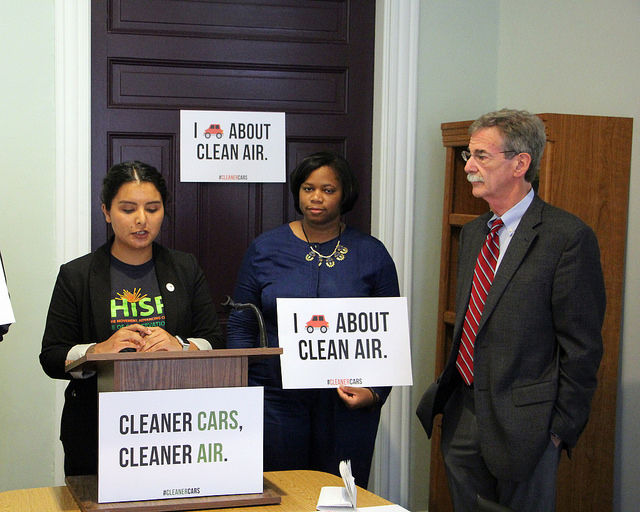Good Climate News this Week: Rules to Cut Pollution, an Offshore Wind Transmission Plan, Emissions Reduction in the EU, and More!
Apr 15, 2024
Johana Vicente, a community organizer for Chispa Maryland, spoke at a Clean Cars Press Conference about the impacts of transportation pollution on her community. Vicente was joined by Maryland attorney general Brian Frosh, and spokespeople from the Maryland Environmental Health Network, the Central Maryland Transportation Alliance, and the Maryland Chapter of the Sierra Club, with each group providing their own perspective on the importance of implementing Clean Car Standards.
 As an organizer for Chispa Maryland, Vicente works closely with Latino families and leaders to ensure that their collective voice is powerful in protecting their communities and the environment. In many cases, that means fighting for important policies such as Clean Car Standards. As Vicente mentioned in her remarks, the current clean car standards are critical to reducing the pollution in our communities.
As an organizer for Chispa Maryland, Vicente works closely with Latino families and leaders to ensure that their collective voice is powerful in protecting their communities and the environment. In many cases, that means fighting for important policies such as Clean Car Standards. As Vicente mentioned in her remarks, the current clean car standards are critical to reducing the pollution in our communities.
“Curbing pollution could not be more important in our fight against climate change. Transportation is the leading contributor to climate-disrupting pollution and as such we need policies like the Clean Car Standards to continue reducing pollution from the transportation sector.”
Although air pollution stemming from our transportation represents a serious public health concern for millions of people in this country, our nation is one in which cars are ubiquitous and often a crucial mode of transportation. Given our country’s reliance on cars, the administration’s ploy to reduce fuel efficiency standards, which are already underway and attainable, means ever-more unnecessary pollution in our air and, with rising gas prices, more strain on peoples’ pocket books.
In fact, 46.9 million people will travel at least 50 miles over this July 4th holiday. According to the American Automobile Association (AAA), the number of travelers has been steadily rising for the last five years and would represent the highest travel volume in the 18-year history of AAA tracking data. Nevertheless, the administration still plans to roll back the money-saving clean car standards that make driving more affordable and our air healthier.
And, like so many other environmental issues, low-income communities and communities of color bear an out sized burden of this air pollution.
“Working with Latino communities in Prince George’s County, I have seen the effects that air pollution has on our families and our communities. These are families who live in some of the most polluted areas of our state, surrounded by high trafficked areas as well as other sources of pollution.”
Vicente went on to share the stories of three people from Prince George’s County who are affected daily by transportation pollution.
“Tyrese Robinson is a concerned mother from Mount Rainier who has to deal with her daughter, Shawna Marie’s severe asthma attacks on a regular basis. This June, Shawna participated on her very first 5K as a proud member of her school’s Girls on the Run Program and as Tyrese shared, her daughter’s ‘major concern was not the strength of her legs but the strength of her lungs.’
Being undocumented, a student from a local high school has to wonder every single school day about whether riding dirty public transportation will trigger her asthma attacks. Having no access to health insurance, pollution does not only affect her health, but it also affects the economy of her entire family.
As concerned parents at their school, Candida and Edith are concerned about students missing school days due to respiratory conditions. As their principal shared, asthma is one of the most common causes of student absences in their school. Candida and Edith are concerned about students’ academic performance when they miss so many school days.”
And those are just a few of the stories. The impacts of air pollution extend far beyond Maryland as millions of people in the United States struggle with the very real consequences of dirty air.
“The burdens of air pollution are real and very common, and we need policies that will protect the health and well-being of communities. Tearing down successful and achievable climate change and air pollution protections endangers communities especially low-income communities and communities of color. We strongly oppose this administration’s attempts to roll back the Clean Car Standards. We need policies that continue to reduce air pollution and combat climate change. We do not want or need to go backwards.”